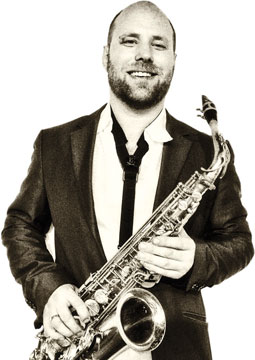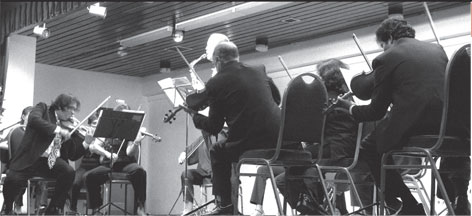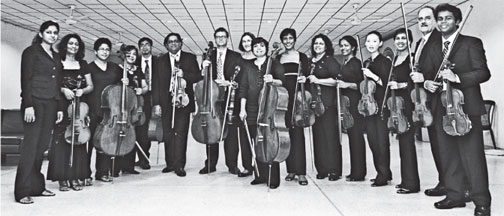|
Review:
A measure of Romanticism with a punch of the bleeding-edge
By Ranga CHANDRARATHNE
|

Pix: Kesara Rathnavibhushana
|
'A Tri-Centenary Journey' concert by the Chamber Music Society of
Colombo, directed by Lakshman Joseph de Saram and featuring Rolf-Erik
Nystrom (Saxophone). was held on the November 13 at the Sri Lanka
Foundation Institute Auditorium.
In their sold-out November 13 concert at the Sri Lanka Foundation
Institute Auditorium, Sri Lanka's elite orchestra of the Chamber Music
Society of Colombo led by Lakshman Joseph de Saram made a strong
statement. Known mostly for their baroque and classical programming, the
'Society' responded decisively to the murmuring that they are just a
one-trick-pony when it comes to repertoire, and unleashed an adventurous
tour through three centuries of great music.
Beginning with Edward Grieg's melancholy 'Elegiac Melodies' and
ending with the bleeding edge sounds of Rolf-Erik Nystrom, one of the
most impressive new saxophonists of the world today, performing a world
premiere work by Sri Lanka domiciled American composer Stephen Allen.
The November 13 concert represented the second collaboration between
the Chamber Music Society and 'Concerts Norway,' the first, was a
ground-breaking performance of the Society's orchestra in Jaffna,
presented months after the conflict ended, the first western classical
concert in the north of the country after three decades of isolation.
 Coming back to the concert at hand, the auditorium of the SLFI,
although very comfortable, was not totally conducive to a classical
music concert, the lighting, flat level seating and general ambiance was
not ideal. Coming back to the concert at hand, the auditorium of the SLFI,
although very comfortable, was not totally conducive to a classical
music concert, the lighting, flat level seating and general ambiance was
not ideal.
The all-important acoustic, a little too much on the dry side and not
the most sympathetic reverberations around. The Lionel Wendt, the CMSC's
usual venue was un-available, we were informed.
Vigour
Having said that, the sixteen member string section of the 'Society'
ably compensated for the lack of acoustic warmth and hall resonance with
more vigour and dynamism from their instruments, especially the front
desk maestros, somehow giving the sense of virility and force of sound,
traits that they are well known for.
Nilanthi Weerakoon, the sole double bass player that night, has to be
credited for maintaining a very evident foundation throughout the
concert.
Jean Sibelius's 'Andante Festivo' was the opening act, sonorous and
romantic was the immediate reaction, with Sibelius's beautiful melodies
given ample space to soar, one would have loved a bigger string section,
or a warmer more reverberant acoustic. But it certainly put you in a
relaxed frame of mind.
The next work was Witold Lutoslawski's 'Five Folk Melodies' for
string orchestra. Quirky and interesting with an exciting flourish at
the end, the modern inner harmonies were illuminated with just the right
amount of balance giving the listener room to enjoy the charming folk
inspired melodic phrases. Some sloppy ensemble work and less than
perfect intonation in the faster movements, were the only obvious flaws.
It was interesting to notice the intense visual communication between
the sections; a vital component of quality music making that is sadly
absent in most other groups of this nature in the country.
Recognized as one of the leading composers in German modernism,
Maximilian Reger's 'Liebestraum' composed in 1898, was clearly inspired
by the great composers of the day, namely Wagner and Bruckner.
Once more, the overly dry acoustics and louder than usual
air-conditioning did not flatter the muted dark sound the orchestra was
striving to produce.
At this point of the concert, the printed program and what was to
transpire on stage made little sense.
|

@ KESARA RATNAVIBHUSHANA 2011 |
The listed Vasily Kalinnikov composed 'Serenade in G minor for
strings' was never played. Instead, Saxophonist Rolf-Erik Nystrom came
onstage and announced he was going to go off the 'program' and perform a
duet with a Nagaswaram player. And there, right between the stoic
un-smiling front desk first and second violinists, Rolf-Erik and the
un-named Nagaswaram player sat crossed legged and commenced a long
loosely raga based discourse of give and take. Although very unusual, it
lasted too long and was also too loud for that hall, the Nagaswaram
being primarily an outdoor instrument. The act may have also come across
as a trifle too cliché, West meeting East living in harmony etc. We
thought the 'Society' was more sophisticated in their programming,
leaving the fusion gimmicks to the shows frequented by the 'fashion
page' crowds.
Elegance
One hopes, the Chamber Music Society will maintain its pristine
elegance in programming and not try to fix something that is far from
broken.
The world premiere of Stephen Allen, the composer in residence for
the Chamber Music Society was next.
Titled 'Of Blood and Honey' and based on a chapter from the 5th
century AD Mahavamsa. It was about a dream the legendary Queen Vihara
Maha Devi had while being pregnant with Prince Gamani.
It would help to quote from the relevant chapter, 'To the Queen of
Great Merit, there came the following cravings: to lay on her right side
in a beautiful bed with a honeycomb the size of a bull at the head of
the bed and to partake of the honey. To drink the water in which she
washed a sword used to behead the chief warrior of King Elara.
To wear a garland of unfaded water lilies brought from the lily ponds
of Anuradhapura where King Elara ruled. In due time Queen Vihara Maha
Devi delivered a noble and beautiful son.'
There is no question that the CMSC relishes playing the works of
Allen, the sheer drive and passion they put in to it was completely
captivating. Although it was difficult to place the Queen's dream in
context to the music, as absolute music goes, it was lovely to listen
to. The extremely virtuosic Alto Saxophone part written for soloist
Rolf-Erik's unique technique will ensure it is never played again
anytime soon.
Impressive
It is indeed a rarity these days for arts organizations to take
chances with new music, given the conservative tastes of most
concertgoers and the abundance of great music out there that is still
waiting to be played. We therefore support the CMSC's progressive
programming wholeheartedly.
Very impressive was Alexander Glazunov's concerto for Sax and String
orchestra, op 109. Both soloist and conductorless orchestra were put to
the ultimate test of executing a complicated piece of music that has
most probably never been done before without a maestro in charge.
Although the concertmaster's bow was visibly and some may say
distractingly used as a simple beat pointer at times, the orchestra
negotiated the treacherous score with amazing accuracy using just their
eyes, ears and each other. A master class in cohesion and mutual
empathy, or just the result of plenty of rehearsals.
The concert ended with a new version of Bela Bartok's much-loved
'Romanian Folk Dances' Sz. 68. This outing had the Alto sax busking
along with the strings.
If excitement and adrenaline was what you wanted, it delivered.
Declining an encore, some may have noticed the inert arrogance in the
musicians as they briefly basked and hurriedly left the stage amidst the
customary standing ovation and bravos from the heady mix of tycoons,
ambassadors and music lovers from all strata.
The hastiness to depart could have also been because the concert was
longer than the usually perfect duration we are accustomed to with the
CMSC.
Patrons
The Chamber Music Society of Colombo, in four short years, has come
to a point where they are only challenged, by themselves.
They have the support and active participation of the richest and
most well-meaning arts patrons in the country, an exclusive group of
professional musicians, and a ever growing audience of serious music
lovers.
A very comfortable, but also dangerous place to be in. One hopes that
they will continue to be the trailblazers and benchmark setters of
western classical music in Sri Lanka, and not, like many others, slip
into a lazy orbit of complacency and boredom which invariably leads to
being just another 'band-for-hire.' This is a whole new Sri Lanka, and
she deserves better.
We look forward to the CMSC's next concert with great anticipation.
Generously sponsored by 'Concerts Norway,' it is worth noting that the
unique cultural collaboration and support of 'Concerts Norway' with many
Sri Lankan arts organizations has certainly been one of Norway's more
successful, non-controversial and all-inclusive ventures in Sri Lanka.
Along with implementing partner Sewalanka, the giant Sri Lankan NGO, the
partnership has initiated many artistic programs, notably, the wonderful
Galle and Jaffna Music Festivals.
Festivals that truly reflect Sri Lanka's ancient multicultural
society, that are transparently not-for-profit, and purely for the sake
of the art, unlike some other unashamedly commercially driven festival
businesses. |

